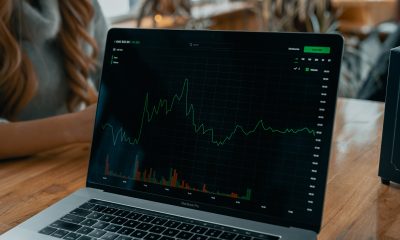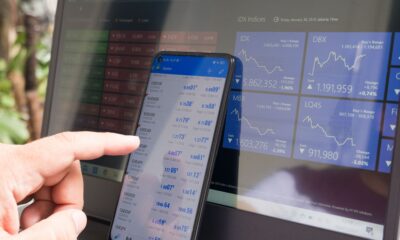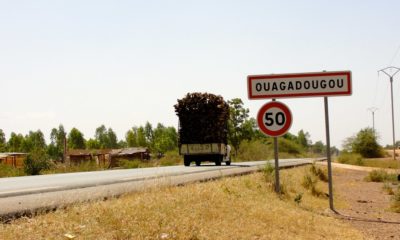Africa
Fitch forecasts a 2.1% drop in ratings and recession in Sub-Saharan Africa
In the report on the evolution of ratings for Sub-Saharan African countries, Fitch forecasts negative economic growth of 2.1% on average this year, anticipating a recovery of 4% in 2021. In the analysis, Fitch warned that African oil-exporting countries such as Nigeria and Angola have been the most affected. The budget deficits and debt levels will increase this year, warned Fitch analysts.

The financial ratings agency Fitch Ratings said that the negative risks of ratings reviews in Sub-Saharan African countries continue, predicting a recession of 2.1% on average, the first in decades.
“The new coronavirus pandemic and the oil price shock have had a severe impact on the sovereign countries of Sub-Saharan Africa that we have been analyzing, leading since March to a downgrading of the rating of seven of the 19 countries to which we have given our opinion on credit quality,” said Fitch Ratings in a report on the evolution of these economies in recent months.
If you want to find out more about Fitch forecasts on the economy of Sub-Saharan Africa and to read the latest economic news in the world with our companion app, Born2Invest.
Only Ivory Coast has a prospect for Positive Evolution
“Four sovereign countries in the region have a Prospect for Negative Evolution, which is particularly high, demonstrating the continued risks of rating downgrades, while four sovereign countries have a CCC [Financial Default] rating, and only one has a Prospect for Positive Evolution, Ivory Coast,” the document, sent to investors, added.
In the report on the evolution of ratings for Sub-Saharan African countries, Fitch forecasts negative economic growth of 2.1% on average this year, anticipating a recovery of 4% in 2021, a figure “which is slightly above the average growth.”
Oil exporting countries are the most affected, a according to Fitch
The shock of falling commodity prices, notably oil, “has had a strong impact on the region through financial and trade links, and domestic containment measures, with many countries imposing movement restrictions and curfews, have caused severe disruption to economic activity in many countries.”
In the analysis, Fitch warned that African oil-exporting countries such as Nigeria and Angola have been “particularly affected”, not only because of their strong direct dependence on financing through this raw material, but also because of the strong linkage of the non-oil sector to oil sector developments.
“Countries with a concentration of tourism revenues, such as Cape Verde or the Seychelles, have also been strongly affected,” pointed out Fitch.
The fall in revenues and the increase in public spending in the health sector “will lead to an increase in budget deficits and public debt levels this year,” analysts warned, noting that this trend will continue at least until next year.
“Although financial market conditions have stabilized somewhat, for most countries debt will continue to increase in 2021 and access to commercial financing remains limited in international markets, which increases the risk of liquidity challenges,” warned Fitch analysts.
The International Monetary Fund (IMF) has provided specific funding lines to combat COVID-19, which 12 of the 19 countries analyzed by Fitch have accessed, “but more countries will have to agree to traditional IMF aid programs to access multilateral and bilateral funding,” the text added.
On the Debt Service Suspension Initiative (DSSI), proposed by the G20 in April, Fitch said that since its analysis refers only to the payment capacity of the issuing countries to private creditors, “the participation of countries does not constitute a ‘default’.”
However, they concluded, “although a more comprehensive private sector moratorium may qualify as a default, this does not seem likely enough to affect countries’ ratings.”
The Fitch report comes at a time when the United Nations Economic Commission for Africa has been meeting with African finance ministers following public discussion in African financial markets on how governments can honor commitments while investing in the spending needed to contain the COVID-19 pandemic.
The G20 group and private creditors suspended Africa’s debt payment
The assumption of the public debt problem as a central issue for African governments was well reflected in the concern that the International Monetary Fund and the World Bank dedicated to this issue during the Annual Meetings held in April in Washington. They made funds available and agreed on a moratorium on paying the debts of the most vulnerable countries to these institutions.
On April 15th, the G20, the group of the 20 most industrialized nations, also agreed to a suspension of $20 billion (about €18.2 billion), in bilateral debt for the poorest countries, many of which are African, by the end of the year, challenging private creditors to join the initiative.
In addition, the UNECA, among other institutions, is designing a plan to swap countries’ sovereign debt for new concessional bonds that could prevent the funds needed to combat COVID-19 from being used to pay creditors.
This financial mechanism would be guaranteed by a multilateral bank with a triple A rating, the highest, or by a central bank, which would convert the current debt into securities with longer maturity, benefiting from five years of exemption from payments and lower coupons (interest payments), according to the UNECA.
Private creditors have also come forward with a plan to defer debt payments without influencing the ratings given by the financial rating agencies. However, fears that default could cut access to international markets have led to few countries announcing debt restructuring to private creditors.
__
(Featured image by SCAPIN via Pixabay)
DISCLAIMER: This article was written by a third party contributor and does not reflect the opinion of Born2Invest, its management, staff or its associates. Please review our disclaimer for more information.
This article may include forward-looking statements. These forward-looking statements generally are identified by the words “believe,” “project,” “estimate,” “become,” “plan,” “will,” and similar expressions. These forward-looking statements involve known and unknown risks as well as uncertainties, including those discussed in the following cautionary statements and elsewhere in this article and on this site. Although the Company may believe that its expectations are based on reasonable assumptions, the actual results that the Company may achieve may differ materially from any forward-looking statements, which reflect the opinions of the management of the Company only as of the date hereof. Additionally, please make sure to read these important disclosures.
First published in Africa21 Digital, a third-party contributor translated and adapted the article from the original. In case of discrepancy, the original will prevail.
Although we made reasonable efforts to provide accurate translations, some parts may be incorrect. Born2Invest assumes no responsibility for errors, omissions or ambiguities in the translations provided on this website. Any person or entity relying on translated content does so at their own risk. Born2Invest is not responsible for losses caused by such reliance on the accuracy or reliability of translated information. If you wish to report an error or inaccuracy in the translation, we encourage you to contact us.

-

 Biotech2 weeks ago
Biotech2 weeks agoWhy Bioceres Shares Slide Into Penny Stock Territory
-

 Africa7 days ago
Africa7 days agoAgadir Allocates Budget Surplus to Urban Development and Municipal Projects
-

 Cannabis2 weeks ago
Cannabis2 weeks agoKONOPEX Expo 2026: Celebrating Europe’s New Era of Legal Cannabis
-

 Biotech4 days ago
Biotech4 days agoVolatile Outlook for Enlivex Therapeutics as Investors Await Clinical Catalysts

























